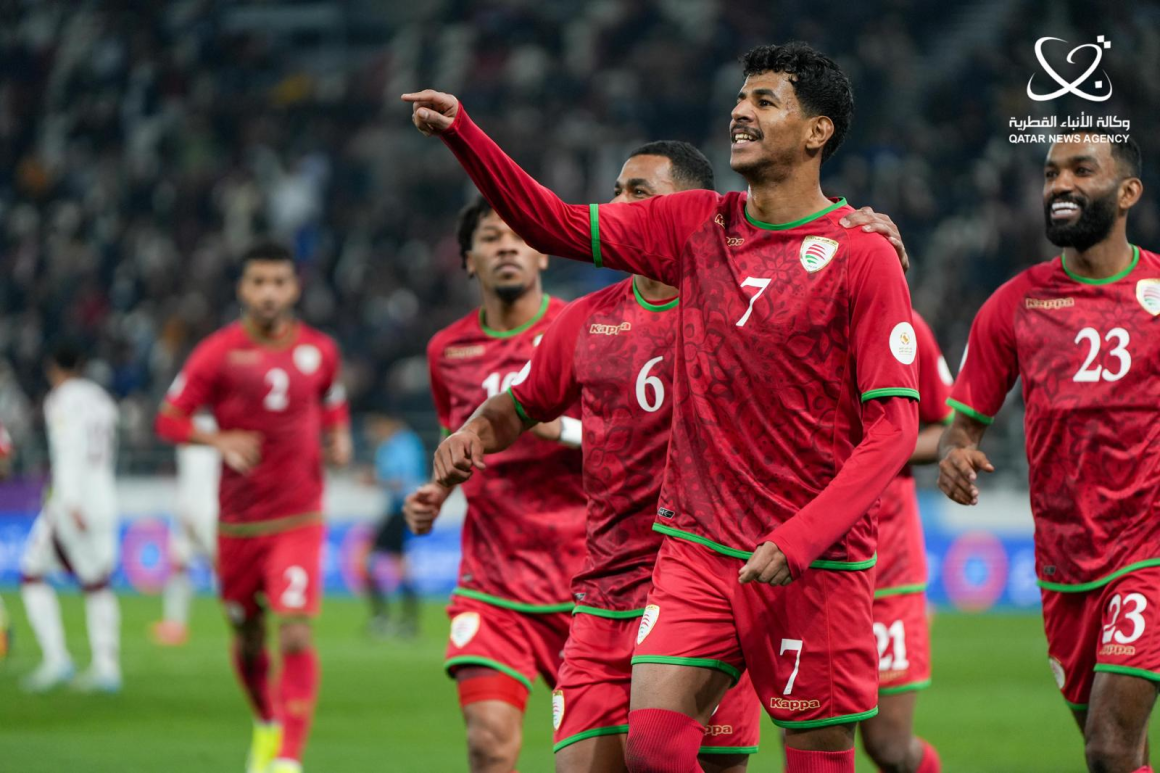Al Annabi’s defensive lapses, among other longstanding issues, complicate road to the semis with a defeat against Oman on Tuesday.
Going on a spree of pinpointing what exactly caused Qatar’s 2-1 defeat at the hands of Oman will fetch a cluttered list that could potentially be endless.
As the referee blew the full time whistle in Jaber Al-Mubarak Al-Hamad Stadium, there were plenty of occurrences over the ninety minutes that have become eerily familiar with Qatar in recent matches. An early lead, then a blow up, defensive lapses, a late surge to no avail… it can go on and on.
Al Annabi suffered their first defeat against Oman since 2009 on Tuesday and the last defeat, coincidentally, was also in an Arabian Gulf Cup tie. What was not co-incidental, however, was the result. A young squad trying to break a wave of recent form makes up for a situation that is far from ideal, either to win or to spark a comeback.
And it showed on Tuesday as well. In a fashion similar to their recent matches, Qatar opened the scoring, blew up the lead, and eventually got swept away by the opposition’s momentum. Credit where it is due, Oman led by their talisman Issam Al-Subhi — who netted the brace — were incisive on their part.
It would be unfair to put the blame on a new squad that is yet to find a form under a new coach. This pattern of defensive dereliction has been with the squad for a while, after the Asian Cup triumph. In fact, Qatar’s last cleansheet came in a 0-0 draw against Afghanistan in the second round of the World Cup 2026 Qualifiers back in June.
Ever since, Al Annabi have conceded 21 in nine games, including heavy defeats like the 4-1 loss against Iran and 5-0 drubbing at the hands of the UAE. In between, Qatar’s defense line has only been the same for two consecutive matches in two occasions.
Such dire is the condition that the opening day 1-1 stalemate against the UAE looked like the first positive for Qatar in a while. Much like that tie, Qatar looked potent and were the ones to score first. Almoez Ali finished teenage midfielder Ibrahim Al-Hassan’s through-ball despite Omani defender Mohammed Al-Maslami marking the Al Duhail striker.

Head coach Luis Garcia, taking charge of only his second game, acknowledged the slump that led to Qatar conceding the equaliser within 20 minutes of the game.
This time, however, Qatar’s undoing started with a penalty as Al-Subhi converted a penalty after he was fouled by Lucas Mendes inside the box in pursuit of a looped through pass.
“We some what retreated [after scoring],” Garcia said after the match, which saw Qatar “We were hasty and we could not keep the ball.”
The hasty approach also comes down to changes that have not fully adapted yet. Jassem Jaber, who used to be the youngest, was the most experienced campaigner in the three-man midfield that started against Oman. As a result, Akram Afif had to drop too deep most often, to fetch the ball. His strike partner, Ali, often was the lone man who has not been as clinical as he used to be at his peak.
At the other end, however, it was another repeating pattern that led to Qatar conceding the eventual winner, seven minutes into the second half. Homam Ahmed, who replaced the injured Sultan Al-Brake in the first half, failed to mark Al-Subhi, who beat goalkeeper Meshaal Barsham to double the lead after multiple time of calling.
It was a similar display of lousy defending in the first half that had nearly allowed Oman to score the winner. Abdulrahman Al-Mushaifri failing to hit the target saved a Qatari defence that had allowed the attacker to pass through it.

Reacting to the second goal, Garcia made a few attacking changes by introducing veteran forward Mohammed Muntari and winger Abdelrahman Moustafa. Yet, the surge was a bit too late for a side that had already been swept by a combination of shaky defending and the opposition momentum.
“In the second half, we were the better side,” Garcia later said. “We pressed in the last minutes and created many easy opportunities, but we were not lucky to register and come up with a tie at least.
“I think the players have given what they have and cannot hold them responsible for the loss. We must work to correct the mistakes and prepare better for the final match against Kuwait.”
Winning against home Kuwaiti side that pulled off an upset by beating the UAE 2-1 on Tuesday will be a tough encounter. A win in the unlikeliest of circumstances is something Qatar have managed to pull off in recent times — including the Asian Cup triumph earlier this year — but for a team that relies so heavily on momentum, it seems to be absent for quite a while now.







